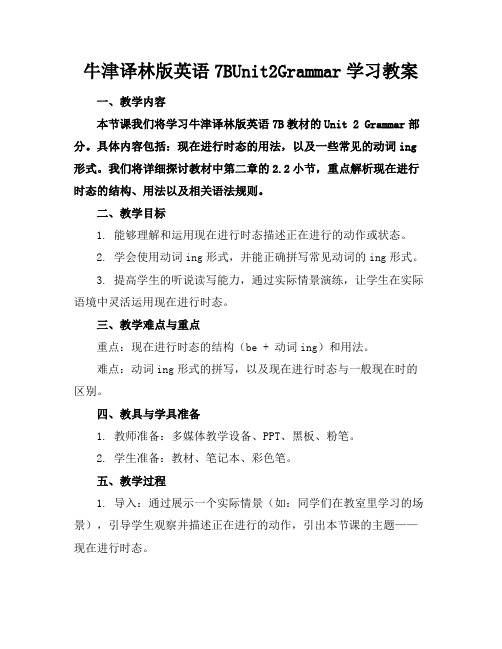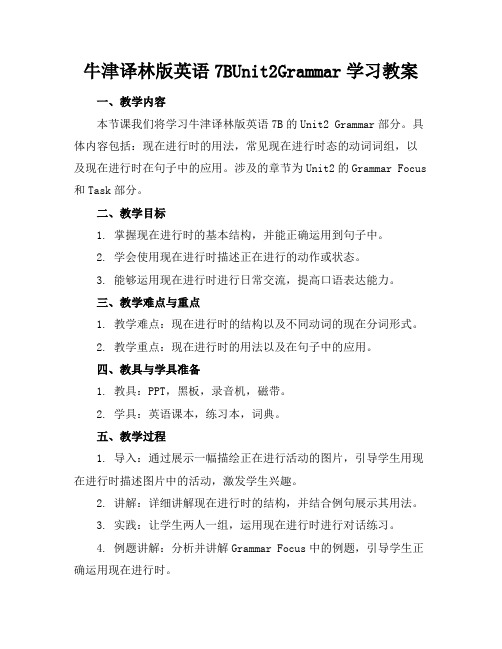新7BU2知识点讲解(译林牛津版)
牛津译林版英语7BUnit2Grammar学习教案

牛津译林版英语7BUnit2Grammar学习教案一、教学内容本节课我们将学习牛津译林版英语7B Unit2的Grammar部分。
具体内容包括:一般过去时的用法,动词过去式的变化规则,以及一些常用动词的过去式形式。
教学内容涉及教材第26页至第28页。
二、教学目标1. 掌握一般过去时的用法,能够正确运用动词过去式描述过去发生的事情。
2. 了解动词过去式的变化规则,能够准确变换常用动词的过去式形式。
3. 能够在实际语境中运用所学知识进行交流,提高英语实际运用能力。
三、教学难点与重点1. 教学难点:动词过去式的变化规则,尤其是不规则动词的过去式形式。
2. 教学重点:一般过去时的用法,以及常用动词过去式的正确运用。
四、教具与学具准备1. 教具:多媒体设备,PPT,黑板,粉笔。
2. 学具:学生用书,练习本,彩色笔。
五、教学过程1. 导入:通过展示一组图片,引导学生用一般过去时描述图片中的场景,激发学生对本节课的兴趣。
2. 讲解:详细讲解一般过去时的用法,以及动词过去式的变化规则。
结合实例进行说明,让学生更好地理解。
3. 例题讲解:分析教材第26页至第28页的例题,引导学生正确运用一般过去时和动词过去式。
4. 随堂练习:让学生完成教材第28页的练习题,及时巩固所学知识。
5. 小组活动:组织学生进行小组讨论,共同完成PPT上展示的练习题,培养学生的合作意识。
六、板书设计1. 一般过去时的用法2. 动词过去式的变化规则3. 常用动词过去式形式七、作业设计1. 作业题目:(1)根据所给情景,用一般过去时完成句子。
(2)将下列动词变为过去式。
答案:(1)I visited my grandparents last weekend.(我上周末拜访了我的祖父母。
)(2)play played, go went, eat ate, read read, write wrote八、课后反思及拓展延伸1. 反思:本节课的教学效果,关注学生在课堂上的参与度,以及他们对一般过去时和动词过去式的掌握程度。
牛津译林版英语7BUnit2Grammar学习教案

牛津译林版英语7BUnit2Grammar学习教案一、教学内容本节课我们将学习牛津译林版英语7B教材的Unit 2 Grammar部分。
具体内容包括:现在进行时态的用法,以及一些常见的动词ing 形式。
我们将详细探讨教材中第二章的2.2小节,重点解析现在进行时态的结构、用法以及相关语法规则。
二、教学目标1. 能够理解和运用现在进行时态描述正在进行的动作或状态。
2. 学会使用动词ing形式,并能正确拼写常见动词的ing形式。
3. 提高学生的听说读写能力,通过实际情景演练,让学生在实际语境中灵活运用现在进行时态。
三、教学难点与重点重点:现在进行时态的结构(be + 动词ing)和用法。
难点:动词ing形式的拼写,以及现在进行时态与一般现在时的区别。
四、教具与学具准备1. 教师准备:多媒体教学设备、PPT、黑板、粉笔。
2. 学生准备:教材、笔记本、彩色笔。
五、教学过程1. 导入:通过展示一个实际情景(如:同学们在教室里学习的场景),引导学生观察并描述正在进行的动作,引出本节课的主题——现在进行时态。
2. 新课内容呈现:讲解现在进行时态的结构(be + 动词ing),并以例句展示其用法。
3. 例题讲解:针对现在进行时态,给出几个典型例题,详细讲解解题步骤和答案。
4. 随堂练习:让学生完成教材中的练习题,巩固所学知识。
5. 小组活动:分组让学生讨论并列举一些生活中常见的动词,然后将其转换为ing形式,进行小组内交流。
6. 情景演练:设置不同的情景,让学生用现在进行时态进行描述,提高学生的实际运用能力。
六、板书设计1. Unit 2 Grammar2. 内容:现在进行时态的结构:be + 动词ing常见动词ing形式举例现在进行时态与一般现在时的区别七、作业设计答案:The children are playing football in the playground.2. 作业题目:将下列动词改为ing形式。
Unit7知识点牛津译林版七年级英语下册

7B Unit71.ability n.能力①复数:②有能力做某事==③有不同的能力2.Believe it or not.3.Look out. ①当心;注意=②③向外看···④从···向外看4.短语:①种树②给某人让座给某人某物=③为某人收集某物为孩子们收集一些书收集n.④打伞干净公园(代词放中间)e.g.打扫干净它5.What can we do for the children in poor areas?我们能为贫困地区的孩子们做什么?①can =②辨析“can”和“be able to”③在贫困地区6.They need clothes and shoes most.他们最需要衣服和鞋子。
①need v.需要1)需要某物2)需要做某事②最需要···7.Some families are not even able to pay for pens and notebooks.一些家庭甚至没钱买笔和本子。
①able 能够1)反义词:2)能够做某事②pay v.为···付钱1)某人为···付钱2)复习“花费”(1)又花钱又花时间(2)只花时间(3)只花钱E.g. 他花了三十块买了三本书。
HeMike花了三十分钟做作业。
8.We can raise some money for them to buy these things.我们为他们筹一些钱去买这些东西。
①raise v. 1)种植种植小麦2)抚养抚养孩子3)筹集为某人筹集某物(去做某事)E.g.为孩子们筹集钱举办聚会②buy v.买1)动ing:过去式:2)给某人买某物=9.We can also collect some books for the children.否定句:We .10.What a brave young man!多么勇敢的一个年轻男人!①同义句:②【重点】感叹句句式:(1)What + (a/an) + 形容词+ 名词!(2)How + 形容词/副词+ 主语+ 谓语!强调部分提前提示:正常句式语序→主语+ 谓语+ 宾语.E.g. Mike做作业做的多么认真啊!正常语序:感叹句:那个小男孩真可爱啊!正常语序:感叹句:=11.He was brave enough to save his neighbour from a fire.他足够勇敢从火中救出他的邻居。
牛津译林7BUnit2知识点梳理

牛津译林7BUnit2知识点梳理牛津译林7B Unit 2知识点梳理Welcome1. meet sb. 和某人见面/见某人 . meet --- meeting n. have a (class/ parent s’) meeting 开班会/开家长会2. welcome sb. 欢迎某人. welcome to sp. 欢迎到某地. You are welcome. 没关系/ 不用谢。
3. like 像. visitors like you 像你这样的拜访者. a new neighbourhood like that 一个像那样的新街区. a bike like yours 像你的一样的一辆自行车4. be afraid of sth. . eg. I am afraid of ghosts. 我害怕鬼。
. be afraid to do…. eg. I am afraid to go out at night. 我害怕在晚上出去。
. be afraid that 从句(委婉语气,表示说话人的担心或看法) . I am afraid (that) he won’t come tomorrow afternoon.我恐怕他明天下午不会来。
. I am afraid not. 我恐怕不是(能)。
/ I am afraid so. 我恐怕是这样。
5. cook 厨师---- cooker 厨具. eg. a rice cooker 电饭煲6. Where do you live? \ Which place do you live in?你住在哪儿?Where are you going? \ Which place are you going to? 你要去哪儿?7. in Ninth Street 在第九大街. in your neighbourhood 在你的街区. around your neighbourhood 在你的街区周边8. one of them 其中之一. some of them 其中一些. most of them 其中大多数9. It’s good to live in a neighbourhood like that.住在像那样的一个街区是很好的。
(完整版)江苏新牛津译林版-7B-知识点汇总,推荐文档

在我家房子的前面有一个足球场,在它的旁边的一个游泳池。
本句型是“There be +名词+介词短语”,意为“在某地有什么”,其中的 be 必须与后面的名词
在数上保持一致。如:
There is an MP3 on the desk. 桌子上有一只 MP3。
There are two MP3s on the desk. 桌子上有二只 MP3。
Canadian Italian German
1
5、in the centre of 在……的中心
16、of one’s own 属于某人自己的
6、on the seventh floor 在第八层
17、some day 将来有一天,总有一天
7、share sth with to 与某人合用/分享礼 18、take a message 传个话,捎个口信
101 one hundred and one
10 ten
UK abbr. (=United Kingdom)英国
flat n. 公寓,套房
area n. 面积
centre n. <英>中心=<美>center
may v. 可以,也许,可能
share vt. 合用;分享
town n. 镇,城镇
own adj. 自己的 vt. 拥有,所有
capital n. 首都
-Hello! May/Could I speak to Mr Green, please? -你好!我能找格林先生接电话吗?
-Speaking./This is Mr Green speaking./Mr Green speaking. -我就是。
注意:用英语打电话时,询问对方是谁,不用 Who are you? 而常用 Who’s that?或者 Who’s the
牛津译林版英语7BUnit2Grammar学习教案

牛津译林版英语7BUnit2Grammar学习教案一、教学内容本节课我们将学习牛津译林版英语7B的Unit2 Grammar部分。
具体内容包括:现在进行时的用法,常见现在进行时态的动词词组,以及现在进行时在句子中的应用。
涉及的章节为Unit2的Grammar Focus 和Task部分。
二、教学目标1. 掌握现在进行时的基本结构,并能正确运用到句子中。
2. 学会使用现在进行时描述正在进行的动作或状态。
3. 能够运用现在进行时进行日常交流,提高口语表达能力。
三、教学难点与重点1. 教学难点:现在进行时的结构以及不同动词的现在分词形式。
2. 教学重点:现在进行时的用法以及在句子中的应用。
四、教具与学具准备1. 教具:PPT,黑板,录音机,磁带。
2. 学具:英语课本,练习本,词典。
五、教学过程1. 导入:通过展示一幅描绘正在进行活动的图片,引导学生用现在进行时描述图片中的活动,激发学生兴趣。
2. 讲解:详细讲解现在进行时的结构,并结合例句展示其用法。
3. 实践:让学生两人一组,运用现在进行时进行对话练习。
4. 例题讲解:分析并讲解Grammar Focus中的例题,引导学生正确运用现在进行时。
5. 随堂练习:让学生完成Task部分的练习,巩固所学知识。
六、板书设计1. Unit2 Grammar Focus2. 内容:现在进行时的结构:主语 + be动词(am/is/are) + 现在分词常见现在进行时的动词词组例句展示七、作业设计1. 作业题目:根据所给词组,用现在进行时造句。
完成课后练习册中的相关习题。
答案:1. 根据所给词组,用现在进行时造句。
She is reading a book.He is playing football.They are watching TV.八、课后反思及拓展延伸1. 反思:关注学生在课堂上的表现,及时发现问题并进行针对性指导。
2. 拓展延伸:鼓励学生在课后观察周围正在进行的动作或状态,用现在进行时进行描述,提高英语实际运用能力。
译林牛津英语7B Unit 2单词讲解(共52张PPT)

office [ˈɒfɪs] n.
office worker
policeman [pəˈliːsmən] n.
police 警察(总称)
postman [ˈpəʊstmən] n.
company [ˈkʌmpəni] n.
station [ˈsteɪʃn] n.
police station railway station
sound sick notice information below better anything worry about design group
lucky shall the day after tomorrow fire make a fire manager office office worker policeman postman
company station police station post post office person job elder by train/bus/ship/bike future artist
New Words of Unit 2
neighbour [ˈneɪbə(r)] n.
wow [waʊ] excl.
will [wɪl] v.
visitor [ˈvɪzɪtə(r)] n.
visit v./n. visit sb/sp have/pay/on a visit to sb/sp
ill (表语)
sickness n.
sick (表语/定语)
notice [ˈnəʊtɪs] n.
notice v. notice sb do/doing
information [ˌɪnfəˈmeɪʃn] n.
[译林版]7B英语各单元重要知识总结
![[译林版]7B英语各单元重要知识总结](https://img.taocdn.com/s3/m/4a29962c9a6648d7c1c708a1284ac850ac020413.png)
[译林版]7B英语各单元重要知识总结Unit 1: My School Life- Vocabulary: important school subjects, school facilities- Grammar: the simple present tense, possessive pronouns- Listening skills: understanding classroom instructions, asking for permission- Speaking skills: talking about school subjects and preferences, describing school facilitiesUnit 2: My Body- Vocabulary: body parts, describing physical appearance- Grammar: the present continuous tense, reflexive pronouns- Listening skills: understanding health problems, giving advice- Speaking skills: talking about physical appearance and health, describing health problemsUnit 3: My Weekends- Vocabulary: leisure activities, weekend routines- Grammar: can/can't for ability, adverbs of frequency- Listening skills: understanding invitations, making plans- Speaking skills: talking about leisure activities and routines, accepting and declining invitationsUnit 4: Our World- Vocabulary: natural disasters, weather conditions- Grammar: present continuous for future arrangements, must/have to for obligations- Listening skills: understanding weather forecasts, talking about future plans- Speaking skills: talking about weather conditions, discussing future plansUnit 5: Healthy Habits- Vocabulary: healthy and unhealthy habits, food and drinks- Grammar: the past tense of be, should/shouldn't for advice- Listening skills: understanding healthy habits and routines, giving instructions- Speaking skills: talking about personal habits, giving adviceUnit 6: My Dream Job- Vocabulary: different jobs, job responsibilities- Grammar: the verb to be, present continuous for future plans- Listening skills: understanding job interviews, talking about job preferences- Speaking skills: talking about dream jobs, discussing future plansUnit 7: Stories and Legends- Vocabulary: traditional stories, magical creatures- Grammar: will for future predictions, reported speech- Listening skills: understanding stories and legends, retelling stories- Speaking skills: talking about stories and legends, retelling storiesConclusion这份文档总结了[译林版]7B英语课程的各个单元的重要知识点。
- 1、下载文档前请自行甄别文档内容的完整性,平台不提供额外的编辑、内容补充、找答案等附加服务。
- 2、"仅部分预览"的文档,不可在线预览部分如存在完整性等问题,可反馈申请退款(可完整预览的文档不适用该条件!)。
- 3、如文档侵犯您的权益,请联系客服反馈,我们会尽快为您处理(人工客服工作时间:9:00-18:30)。
7B Unit2 NeighboursComic strips1、Where are you going?Be going 此处为“现在进行时表将来”,这主要用于表示按计划或安排将要发生的动作。
Go, come, leave等表示位移的动词,都可以用现在进行表将来。
例如:将要回家________________将要离开________________2、I’m going to visit our new neighbours.(1)be going to ,后接动词原形,用于表将来(2)neighbour可数名词,“邻居”3、I’m afraid they won’t welcome visitors like you.(1)visitor,可数名词,“参观者,访问者”以-or结尾的表示人的名词有:Actor男演员translator翻译inventor发明家Collector收集者doctor医生(2)like介词,意为“像”,其反义词为unlike相关短语:be like look likeWelcome to the unit1、waiter waitress均可数名词2、How many buildings are there in your neighbourhood?neighbourhood为不可数名词,“街区,居民区”常用短语:in the neighbourhood 在街区in the neighbourhood of “大约,左右”3、Most of them have 14 floors.Most of 表示“……中的大多数”,后接可数名词复数作主语时,谓语动词用复数形式;也可接不可数名词,此时谓语动词用单数形式。
Eg: 大多数男孩喜欢足球。
____________________________________________________大部分水是干净的。
____________________________________________________4、What do you have around your neighbourhood?around为介词,“在……的周围”;也可作副词,“在周围,到处”。
Eg: 他住在伦敦周围。
____________________________________________________我们围着桌子坐。
____________________________________________________5、They’re kind and helpful.Helpful为形容词,“愿意帮忙的,有用的”短语:be helpful to sb.“对某人很有帮助”Reading1、Is there a community centre in your neighbourhood?Community可数名词,“社区,社团”,此处为名次作定语。
Community作主语时,谓语动词可用单数或复数形式。
Eg: 我们的社区很大。
____________________________________________________我们社团(的人)打算去游长城。
____________________________________________________2、There are some social workers.Social形容词,“社会的”常见短语:social worker“社会工作者”social problem“社会问题”3、They help us with all kinds of problems.(1) help sb. With sth.“帮助某人某事”【拓展】与help有关的固定短语:Help sb. (to) do sth.帮助某人做某事Be of some/ no/ much help to sb.对某人有些/没有/很有帮助Help oneself (to)自用(食物等)Help sb. out 帮助某人客服困难、解决问题、完成工作等With the help of 在……的帮助下Help to do sth.有助于做某事(2)all kinds of各种各样的【拓展】·kind名词,“种类”,同义词:sort ~ hats 各种各样的帽子·kind形容词,“亲切的,仁慈的”be kind to…对……好4、There’s something wrong with my computer.(1)句型There is something wrong with sth.意为“某物坏了”,相当于Something isn’t working well,还可以用Something is broken.替换。
Eg: 我的手表坏了。
____________________________________________________【拓展】:There is nothing wrong with sth.某物没有坏。
Is there anything wrong with sth.?某物有没有出问题?(2)something不定代词,意为“某事,某物”,多用于肯定句中。
在疑问句中常用anything。
在否定句中常用nothing。
作主语时谓语动词用单数形式。
Eg: Something happens.有事发生了。
注意:在疑问句中,当说话人希望得到肯定答复时,也可以用something。
Eg: Do you have something that I can use?5、I’m going to ask a computer engineer to check it.(1)engineer可数名词,意为“工程师”,其前不定冠词用an。
(2)Check及物动词,意为“检查,核实”与check有关的短语:check in 登记;检票check out 结账退房check up 检验6、My cousin Annie’s bicycle is broken.Broken形容词,“弄坏了的;伤残的”,可位于名词前作定语或系动词前作表语。
Eg: 这台电视机坏了。
____________________________________________________你能看见那个破的窗子吗?____________________________________________________ 【拓展】broken还有“骨折的;零碎的;不连贯的”意思7、…so she’s going to ask someone to fix it.……所以她打算找人修一修。
(1)someone不定代词,意为“某人”,用作单数,与somebody用法相同。
Eg: 有人想见你。
____________________________________________________(2)fix 及物动词,意为“修理;安装”【辨析】fix与mendFix 修理,表示使得受到一定损坏或失灵的东西恢复其性能或机能,其对象范围很广,从道路、机器到日常用品。
Mend 修补,表示修补破损的东西,使其恢复原样,一般指较小的物品。
【拓展】fix up意为“修理;安装”Eg: 你的自行车坏了,让我们修一修吧。
____________________________________________________8、Can you find anyone to help you with your homework?anyone为不定代词,意为“任何人”,相当于anybody。
常用于疑问句或否定句中,肯定句中用somebody或someone。
Eg: 有人来过吗?____________________________________________________【辨析】anyone与any oneanyone 用作代词,只能指人,意为“任何人,有人”,不能与of短语连用any one既可以指人,也可以指物,意为“任何一个人或任何一个物”,强调只限一个,可以和of短语连用,表示多数之中的任何一个Eg:家里有人吗?_____________________________________________________________ 你可以从这些当中选择任何一个。
________________________________________________ 9、Some college students are ready to help.(1)college 可数名词,意为“学院”相关拓展短语:Be in college正在上大学go to college上大学(2)be ready to do sth.“准备做某事”Eg: 他随时准备帮助他人。
________________________________________________________ 【拓展】be/ get ready for+ 名词意为“为……做准备”Eg: be ready for the lesson/ class准备好上课10、You’re lucky to have a community centre like that, Simon.Lucky形容词,意为“幸运的”,反义词为unlucky,意为“不幸的”。
短语be lucky to do sth.意为“很幸运做某事”Eg: 我很幸运成为你的朋友。
______________________________________________________ 你是个幸运儿。
You’re a lucky dog.【拓展】(1)lucky的名词形式为luck,意为“运气”Good luck to you! 祝你好运!(2)lucky的副词形式为luckily,意为“幸运地”Luckily, he is still alive.幸运的是,他还活着。
Grammar ——一般将来时表示将来某一时刻或经常发生的动作或状态。
①一般将来时的时间状语有:tomorrow,this (afternoon),next (year),one day,now,soon, someday,sometime, in the future, when引导的从句等。
②用will构成的将来时,表示动作与人的主观愿望无关。
“shall”用于第一人称,“will”用于所有人称。
如:I will graduate from this school soon.(我很快就要从这所中学毕业了)/ You will stay alone after I leave.(我走了之后你就要一个人过了)③“am/is/are going to+动词原形”表示打算或准备要做的事情,或者主观判断即将要发生的事情,而“am/is/are to +动词原形”表示安排或计划中的动作。
